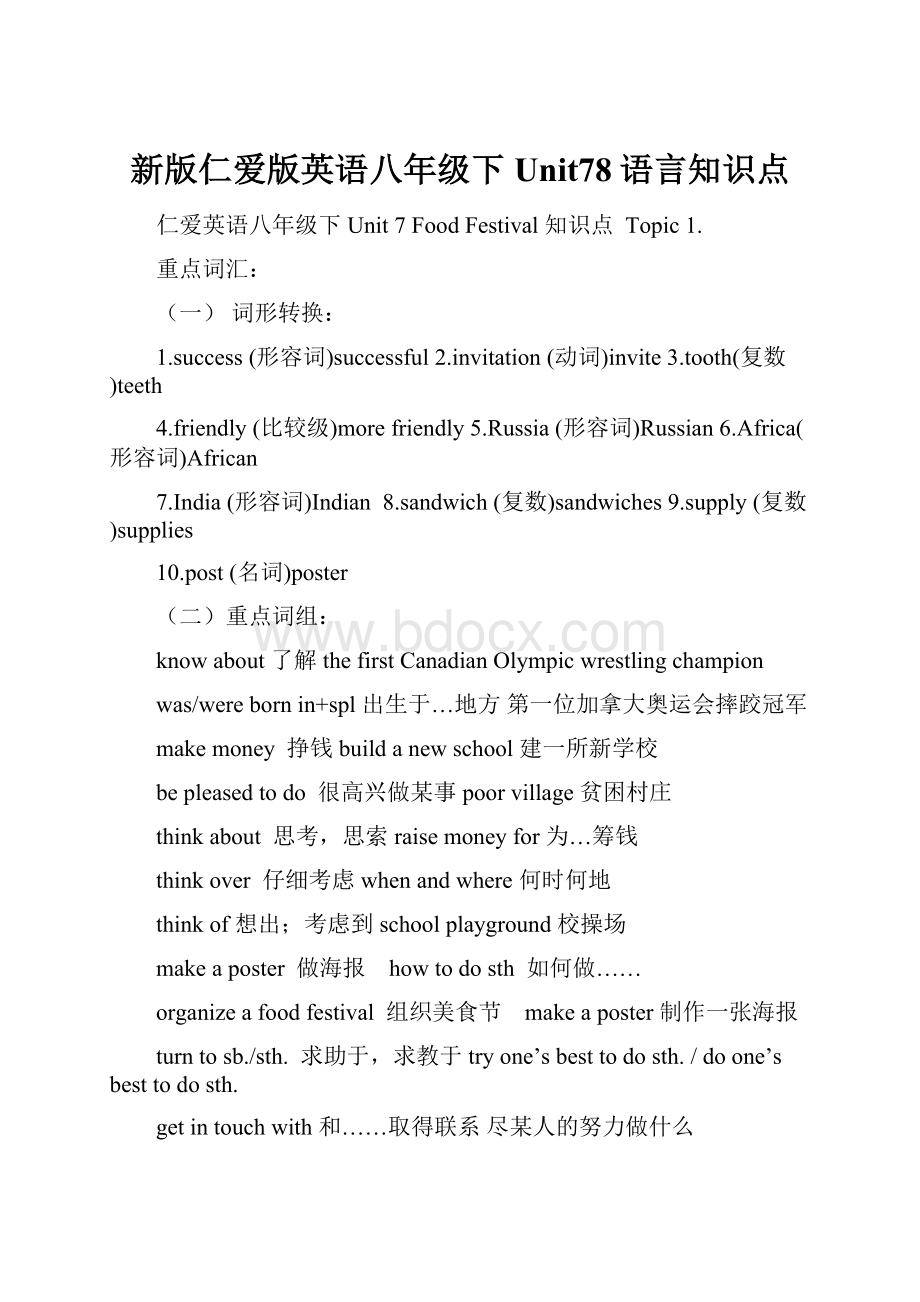新版仁爱版英语八年级下Unit78语言知识点.docx
《新版仁爱版英语八年级下Unit78语言知识点.docx》由会员分享,可在线阅读,更多相关《新版仁爱版英语八年级下Unit78语言知识点.docx(26页珍藏版)》请在冰豆网上搜索。

新版仁爱版英语八年级下Unit78语言知识点
仁爱英语八年级下Unit7FoodFestival知识点Topic1.
重点词汇:
(一)词形转换:
1.success(形容词)successful2.invitation(动词)invite3.tooth(复数)teeth
4.friendly(比较级)morefriendly5.Russia(形容词)Russian6.Africa(形容词)African
7.India(形容词)Indian8.sandwich(复数)sandwiches9.supply(复数)supplies
10.post(名词)poster
(二)重点词组:
knowabout了解thefirstCanadianOlympicwrestlingchampion
was/werebornin+spl出生于…地方第一位加拿大奥运会摔跤冠军
makemoney挣钱buildanewschool建一所新学校
bepleasedtodo很高兴做某事poorvillage贫困村庄
thinkabout思考,思索raisemoneyfor为…筹钱
thinkover仔细考虑whenandwhere何时何地
thinkof想出;考虑到schoolplayground校操场
makeaposter做海报howtodosth如何做……
organizeafoodfestival组织美食节makeaposter制作一张海报
turntosb./sth.求助于,求教于tryone’sbesttodosth./doone’sbesttodosth.
getintouchwith和……取得联系尽某人的努力做什么
what’smore而且haveasweettooth/likeeatingsweetfoot喜欢吃甜食
nevermind没关系Indianfood印度食物
workhardat在┅┅方面努力学习beefcurry咖喱牛肉
chocolatecookies巧克力甜饼blackbread黑面包
friedrice炒米饭Ren’aiInternationalSchool仁爱国际学校
decidetodosth.决定做……sendsbane-mail给某人发一封电子邮件
lateron再过一些时候;后来e-mailaddress邮箱地址
It’sagreatpity.很遗憾nevermind/Itdoesn’tmatter.没关系
overphone通过电话ahighschool高中
holdon/holdtheline等一等(别挂电话)What’sup?
怎么了?
什么事?
avillageschool一所乡村学校onlyafew很少,只有几个
what’sworse,更糟的是bepleasedwith对某事感到高兴/满意
Pleasegivemybestwishestoyourfriends.makephonecalls打电话
请向你的朋友们致以最衷心的祝福。
ashoppinglist购物清单
重点句型:
1.DoyouknowaboutDanielIgali?
你知道丹尼尔·艾格雷吗?
knowabout“了解”,knowalotabout…“对某事了解很深”,knowalittleabout…“对某事或某人了解一些”,而know是“知道”,“认识”之意,如:
Iknowher.我认识她。
Iknowabouther.我了解她。
二者意思不同。
2.That’sgoodenough.
Ihaveenoughmoneytobuythebook.
3.I’dloveto,butI’msorryIcan’t.
I’msorrytodosth.
I’msorry(that)…
4.Let’stryourbesttomakeitsuccessful.让我们尽力成功举办这次美食节活动。
①tryone’sbest=doone’sbest尽力,努力
②makesb./sth.successful使……获得成功
5.What’smore,I’msurethatfriedriceanddumplingwillbepopular.
而且,我相信炒米饭和饺子会很受欢迎。
①What’smore(口语)而且,更有甚者
Sheisabeautifulgirl.What’smore,sheisfriendlytous.
她是一个漂亮的女孩,而且对人也友好
6.It’sapleasure.
用于感谢的答语还有:
That’sOk./That’sallright./You’rewelcome./Mypleasure.
7.MayIinviteyoutoourfoodfestival?
Invitesb.tosomeplace邀请某人去某处
Invitesb.todosth.邀请某人做谋事如:
MayIinviteyoutogoshoppingwithme?
我能邀请你一起去购物吗?
8.Extensionsixzerozerosix,please.请接分机号6006。
相当于CanIhaveextensionsixzerozerosix,please?
或Pleasedialextensionsixzerozerosix.
9.Keepupthegoodwork.继续努力吧。
Keep(on)doingsth.继续/重复做某事
Keepsb./sth.doingsth.让某人持续做某事;让某事持续进行如:
Hekeptwritingallthenight.他整晚在写作。
I’lltrynottokeepyouwaiting.我会尽量不让你久等。
10.Ithasonlyafewschoolsupplies.学校设施简陋。
句中supplies是作名词用。
如:
onlyafewschoolsupplies,这里supplies是名词复数,
译为“学校设施简陋”,supply作为动词用,意为“提供”、“供应”。
如:
Theschoolsuppliesbooksfor/tothechildren.=Theschoolsuppliesthechildrenwithbooks.
学校提供孩子们书籍。
即:
supplysth.to/forsb.或supplysb.withsth.
11.WestudentswillcookmanydeliciousinternationalfoodsforsaleinordertoraisemoneyforavillageschoolinNigeria.
为了给尼日利亚一所乡村学校筹钱,我们学生将做许多美味的国际食品出售。
①inorderto…意为“为了……”,它引导的动词不定式短语作目的状语。
否定结构用inordernotto,比soasto正式,也可以用sothat代替。
如:
-
He’lltryhisbesttoworkhardinorderto/soastocatchupwithhisclassmates.=
He’lltryhisbesttoworkhardsothathecancatchupwithhisclassmates.
他将尽全力努力学习为了能赶上他的同学。
②raisemoney集资,筹款
语法学习:
宾语从句
宾语是句子的一个重要成分,它可以由名词、代词、名词短语或句子充当。
当句子充当助于时,这个句子就称为宾语从句。
宾语从句可以由连词that,whether,if,代词who,whose,what,which和副词when,where,how,why等引导。
现先着重介绍连词that引导的宾语从句。
学习宾语从句应注意几点:
1.引导词2.时态(时态一致)3.语序(陈述句语序)
下面就举例说明:
Iheardthathejoinedthearmy.我听说他参军了。
I’mafraid(that)youarewrong.恐怕你错了。
Ithinkhewillbeallrightinafewdays.我想他几天就会好了。
Ihopethatyou’llbebettersoon.我希望你很快康复。
Idon’tthink(that)youareright.我认为你不对。
Ididn’tthinkhewaswrongyesterday.我认为他昨天没错。
Theteachertoldme(that)theearthisround.老师告诉过我,地球是圆的。
征求对方意见或提建议的句型:
提建议、征询对方意见的四种表达方式
(1)ShallI(we)……?
常用在提供帮助,提出建议,要求给以指示和征求意见,常译为:
我(们)……好吗?
如:
ShallI(we)openthewindow?
我(们)把窗户打开,好吗?
(2)MayI……?
常用在征求对方意见的句子中,常译为“我可以……吗?
”
如:
MayIinviteyoutoorganizetheFoodFestivalwithme?
我可以邀请你和我一起组织这次美食节吗?
(3)Willyou……?
常用于请求对方完成某一动作,同时征求对方意见,常译为“请你……好吗?
”如:
Willyoupleasecallmethisevening?
请你今晚打电话给我好吗?
(4)Wouldyouliketo…?
Wouldliketodosth.想要做某事。
如:
Wouldyouliketoeatanothermooncake?
你想再来一块月饼吗?
日常交际用语:
谈论社交活动中有关常见的日常交际用语:
Shallwehaveafoodfestivaltomakemoneyforhisschool?
MayIinviteyoutoourfoodfestival?
I’dloveto,butI’mafraidIhavenotime.
Willyoupleasetellmesomethingabout…?
What’sup?
Thankyouforinvitingmetoyourfoodfestival.
Topic2I’mnotsurewhetherIcancookitwell.
重点句子
SectionA
1.But I'm not sure whether I can cook it well. 但是我不能确定我是否能做得好。
此句句型是:
主语+系动词+形容词+从句,从句可以用that或疑问词引导,that有时省略。
例如:
I'm not sure what I should do. 我不能确定我该做什么.
I'm sure that he will come. 我相信他会来。
2.It’s very kind of you. 你真是太好了。
/太感谢你了。
这句话用于表扬、赞美对方,也可用于对对方所做的事表示感谢。
—Here are some candies. Help yourself. 这里有些糖果,请随便吃吧。
—It’s very kind of you. 太谢谢你了。
拓展:
1)be kind to sb. 意为“对某人友好,善待某人”。
We must be kind to the old. 我们应该善待老人。
2)be+ adj.后接of sb.与接for sb.的区别
①It is kind of you to say so. 你这样说太客气了。
(暗含You are kind. 之意)
②It is important for us to learn English well. 对于我们来说学好英语很重要。
(无We are important. 之意)
在句型①中形容词kind表示的是of后边人称的特点、特征或性格。
如:
good, nice, wise, clever, cruel等。
在句型②中形容词important不表示for后边人称的特点等情况,而有“对于某人来说”之意。
用于句型②中的形容词通常没有限制。
3)kind n. 意为“种类”。
a kind of一种 many kinds of许多种
all kinds of各种各样的 different kinds of不同种类的
3.Well done!
干得好!
表示表扬和鼓励的句子。
类似的还有:
Very good!
非常好!
Wonderful!
非常好!
Excellent!
好极了!
Perfect!
太棒了!
Keep trying!
继续努力!
You can do it!
你能行!
4.First,cut somecookedmeatvery finely.
(1)cut (up)…finely意为“把……细细地切碎”。
副词修饰动词时通常放在动词后面。
类似的还有:
fry the meat lightly轻轻地炒一炒肉
add the rice slowly慢慢地把米饭加去
cut up sth./ cut sth. up意为“将……切碎”。
cut sth. 切开,cut sth. into(small pieces)意为“将某物切成(碎片)”。
He cut the beef into thin slices. 他把牛肉切成薄片。
(2)完成一件事情,需要一连串的动作,这时就可以用以下表示先后顺序的连词:
First…next…then…after that…finally…
首先……,接下来……,然后……,之后……,最后……
5.You need to add the rice slowly. 慢慢地添加米饭。
add v. 增加,添加 如:
The tea is too strong; please add some more hot water. 这茶太浓了,请再加点开水。
拓展:
常与add连用的短语有:
add to…添加在……上;add…to…将……加在…… add up加起来;add up to总计为
Then you can look for something new to add to your collection. 然后你可以再找些新的东西添加到你的收藏品里。
If you add five to five, you can get ten. 5加5等于10。
Please add up the numbers. 请把这些数字加起来。
My whole school education adds up to no more than two years. 我所受的全部学校教育加起来不超过两年。
SectionB
1.Would you mind if we learn to make it from you?
我向你学习做它(三明治)好吗?
(1)Would you mind if…?
请求允许或客气地请人做事。
Would you mind if I open the window?
我打开窗户好吗?
链接:
1)Would you mind+ v-ing…?
用来客气地提出请求,
否定形式为:
Would you mind+ not+ v-ing…?
如:
Would you mind giving me a glass of water?
请给我一杯水,好吗?
Would you mind not smoking?
请你别吸烟好吗?
2)Would you mind+ sb’s+ v-ing…?
用来提出询问,征求对方的意见(在非正式文体中v-ing前的所有格可换为宾格)。
如:
Would you mind my (me) smoking here?
我在这里吸烟你介意吗?
回答带有mind的问句时要注意yes或no都是针对mind(介意、在乎)选用的,表示“介意”、“在乎”时,选用yes,后面跟的句子是不让对方做某事;表示“不介意”、“不在乎”时选用no,后边跟的句子是允许对方做某事。
如:
—Would you mind my smoking?
你介意我抽烟吗?
—Yes, you’d better not. 是的,你最好别抽。
—No, certainly not. 不介意,你当然可以抽。
(2)learn sth. from sb. 意为“从某人那里学……”。
如:
We can learn English from our English teacher. 我们可以跟英语老师学英语。
2.Practice makes perfect. 熟能生巧。
此句是很常用的一条谚语。
SectionC
1.If you go to a formal western dinner party for the first time, you’d better know about western table manners. 如果你第一次参加正式的西方宴会,最好了解一下西方的餐桌礼仪。
(1)for the first time意为“第一次”。
如:
I went to Beijing for my holiday in 2002 for the first time. 2002年,我第一次到北京去度假。
(2)table manners意为“餐桌礼仪”。
manner作可数名词,复数为manners,意为“礼貌、规矩、礼节”。
have (no) manners/ good (bad) manners 有(没有)礼貌。
如:
It’s bad manners to talk with a full mouth. 嘴里吃着东西说话是不礼貌的。
2.When you sit down at the table, take your napkin and put it on your lap. 当你坐下准备就餐时,取出餐巾并铺在你的膝部。
(1)at the table意为“(坐或站)在桌子旁边”。
如:
Ask the child not to stand at the table. 叫那个小孩别站在桌子旁边。
(2)put…on…意为“把……放到……上”。
put on意为“穿上,戴上”。
如:
He puts his computer on the desk. 他把他的电脑放在桌子上。
She puts on her glasses to read the letter. 她戴上眼镜来看信。
3.Thedinneralwaysstartswithasmalldish.
begin/startwith以……开始,
Let’sstartourclasswithUnit1.让我们从第一单元开始上课。
4.When you drink to somebody, you’d better raise your glass and take only a sip. 当你向某人敬酒时,你最好举起酒杯而且只喝一小口。
(1)drink to sb./ sth. 为……干杯(祝酒)
Let’s raise our glasses and drink to Kate and Tom!
让我们举杯为凯特和汤姆祝福吧!
(2)somebody不定代词,意为“某个人,有个人”。
链接:
somebody, anybody, nobody, everybody可与someone, anyone, no one, every one通用,在句中作主语、宾语和表语时,视为单数。
someone, everyone仅指“人”,而some one, every one通常指“物”,也可指“人”。
Not every one can do this. 并非人人都能做这事。
everyone不能与of连用,只能说every one of…
(3)raise glass意为“举杯”。
词组:
raise one’s hand举手
raise one’s eyes举目,仰视 raise a family养家,抚养子女 raise money募捐
(4)take a sip意为“喝一小口”。
如:
If you are thirsty, you can take a sip of water. 如果你口渴了,可以喝一小口水。
5.Remember not to drink too much. 记得不要喝太多。
(1)remember to do sth. 意为“记得要做某事(事情还没有做)”。
否定形式为:
remember not to do sth.
remember doing sth. 记得做过某事(事情已经做过)
Remember to post the letter for me. 别忘了替我寄信。
I remember seeing him once. 我记得曾见过他一次。
(2)too much在句中作状语,修饰动词drink。
拓展:
much too和too much的区别。
1)much too表示“(实在)太……”的意思,常用作副词,后接形容词或副词。
]
The coat is much too large for me. 这件上衣我穿实在太大。
He studies English much too hard. 他学习英语实在太刻苦了。